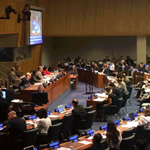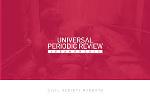West Bank and Gaza
Published on Thu, 2017-08-31 12:30
Following 8 days involving 43 Voluntary National reviews (VNR) and 147 side events with 77 ministry-level participations and 2458 registered stakeholder representatives, the statistical outlook of the 2017 High-Level Political Forum on Sustainable Development Goals is quite promising. It is only the second review and just two years after the kick-off for the implementation of a universal agenda towards leaving no-one behind. Yet, time is marching on and there is a long way to go on the level of implementation. At the 2017 HLPF, Jordan became the third country from the Arab region to participate in the VNR process; following Egypt and Morocco in the 2016 review. The first words of Jordan’s national report made reference to the same issues: ‘the power of working together’ and taking into consideration ‘the urgent world issues’. |
Published on Fri, 2016-03-25 11:14
The United Nations Special Rapporteur on the situation of human rights in the Palestinian territories occupied by Israel since 1967, Mr. Makarim Wibisono of Indonesia, has stressed the critical need for the international community to increase its protection of the Palestinian population. Mr. Wibisono, who has resigned because of Israeli non-cooperation with his task, while presenting his final report to the Human Rights Council, recalled the well-documented violations related to the Israeli occupation policies and practices in the Occupied Palestinian Territory (OPT), and appealed to the Government of Israel, as the occupying power, to take practical steps to implement protections under international law as it pertains to the Palestinian population living under occupation. |
Published on Mon, 2015-11-16 13:59
During the 23rd Working Group session of the Universal Periodic Review the situation of human rights in Lebanon were reviewed by the UN member states. During the interactive dialogue several member states directed recommendations to Lebanese Delegation headed by Permanent Representative of Lebanon to UN Mission in Geneva Mrs. Najla Riachi Assaker on the issues of women’s rights, torture, migrant workers, establishment of a moratorium on the death penalty. Three and a half hour session provided the occasion for both national delegation representatives and the UN Member states to shed light on the ‘extraordinary challenges’ the country is facing, namely the Syrian crisis and the terrorism in the neighbourhood. Unfortunately as civil society groups engaged in the UPR process and working on issues of human rights and development, we believe that these challenges cannot be ‘excuses’ for non-implementation of recommendations accepted back in 2010 and in overall providing maximum available resources for ensuring the full enjoyment of human rights in the country. |
Published on Sat, 2015-09-12 07:48
The Palestinian Non-governmental Organizations Network (PNGO) raised concerns and warned of a dangerous deterioration in the humanitarian situation in the Gaza Strip due to severe drop-long power cuts caused by the fuel outage. PNGO stated that power outage in the besieged Gaza Strip seriously affects basic life facilities in particular health,water, education and sanitation as well as vital sectors. PNGO demanded the international community and Arab and Palestinian parties as well to immediately carry on their responsibility to find real time and strategic solutions to the power cut offs in the Gaza Strip. |
Published on Tue, 2014-12-23 09:28
For the fourth successive year, a delegation of human rights and development civil society organizations from the Arab region will be visiting the European institutions in Brussels between the 8th and the 12th of December 2014. The Arab delegation includes civil society representatives from Egypt, Jordan, Palestine, Morocco, Syria, Tunisia and Lebanon. This visit seeks to provide a platform for dialogue and exchange between civil society organizations from the Arab region and European policy makers at the Parliament and Commission around the EU’s support and involvement in the region. |
Published on Thu, 2014-09-04 18:43
A new article produced by Mohsen Abu-Ramadan, the President of the Palestinian NGO Network (PNGO) in Gaza. The article describes “the horror of the aggression and its negative impact on all aspects of life” which compelled the authorities to announce Gaza a disaster zone. Moreover, the article calls for “Emergency interventions by the authorities, international organizations, and UN agencies” to ensure an active and dynamic mobilization to address the effects of the aggression on the various social and economic sectors. |
| Source: . Published on Mon, 2014-08-18 00:00 |
| Source: . Published on Sat, 2014-08-16 00:00 |
Published on Thu, 2014-08-14 19:45
Social Watch calls on the international community to declare the Gaza Strip as an "international humanitarian disaster zone", as requested by the Palestinian NGOs. The flow of humanitarian assistance needs to be accelerated and civilians need to be protected. "The recurrence of these episodes in Gaza -says the Social Watch statement- is the result of not having acted before on similar war crimes and of not having pursued with good faith negotiations towards a lasting peace. The current ceasefire has to be maintained and the international community should back it proactively. |
SUSCRIBE TO OUR NEWSLETTER









